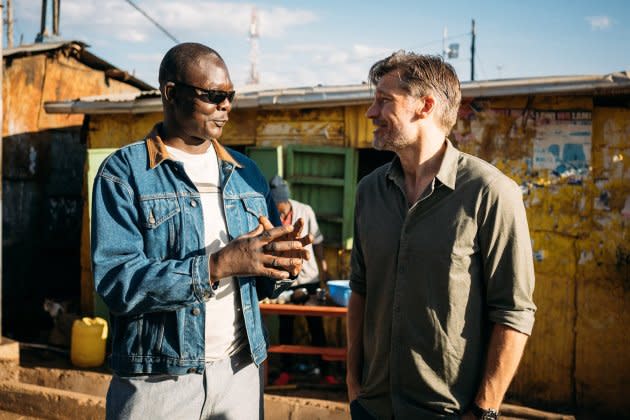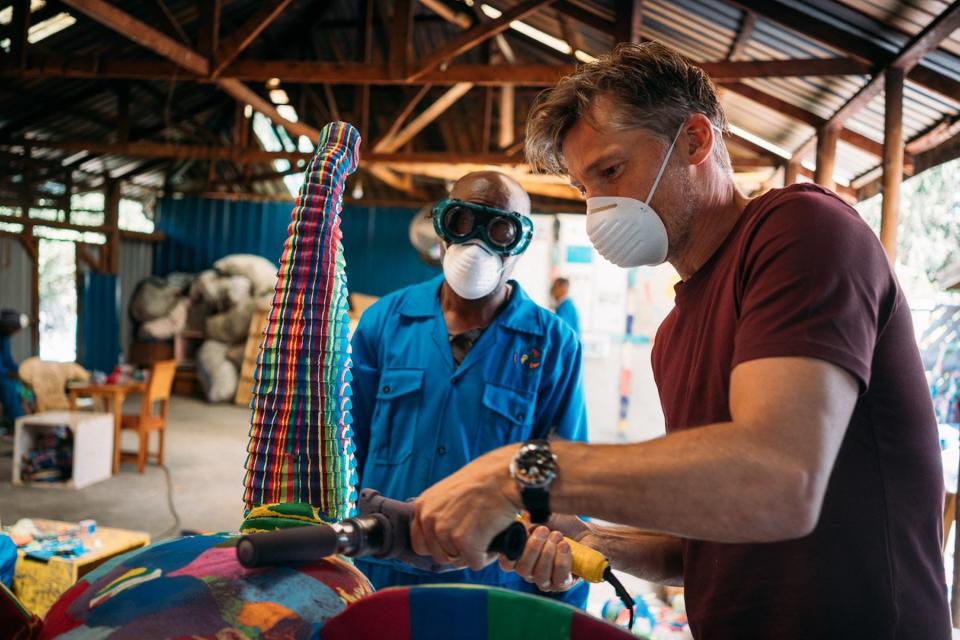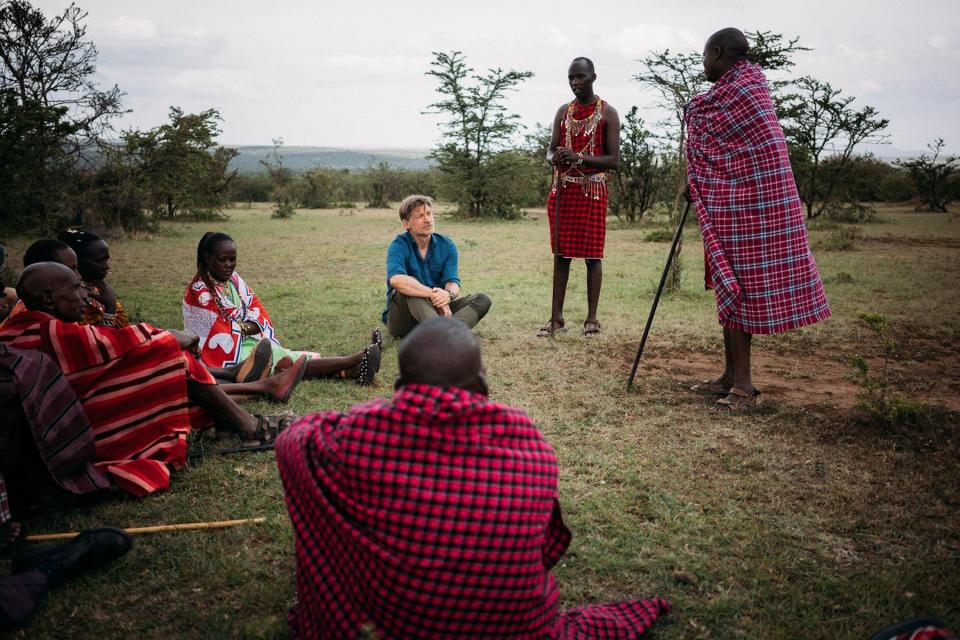A ‘Game of Thrones’ Star Fights for Our Future
- Oops!Something went wrong.Please try again later.
- Oops!Something went wrong.Please try again later.

“We need to imagine a different version of our future,” says Nikolaj Coster-Waldau.
The photogenic Danish actor from Game of Thrones and the upcoming Apple TV+ series The Last Thing He Told Me is set to feature in a new Bloomberg Originals series, Rolling Stone can exclusively reveal. An Optimist’s Guide to the Planet is a six-episode series from Cream Productions and Wildfire Television that will debut sometime in 2024, and features the Emmy-nominated actor and United Nations Development Programme Goodwill Ambassador traveling the globe to showcase the efforts of people who are finding innovative ways to combat the climate-change crisis and transform the environment.
More from Rolling Stone
Why I Chose to Appear in Netflix's Controversial Pornhub Documentary
From Flights to Daily Commutes, Keep Your Gear Safe With the Best Anti-Theft Backpacks
Anthony Pellicano Doc 'Sin Eater' Revisits Chris Rock Rape Allegation
An Optimist’s Guide to the Planet sees Coster-Waldau visit everywhere from the Nashulai Maasai Conservancy in Kenya to Solar Sister in Tanzania to an electric aircraft company in Burlington, Vermont. The series was inspired by the star’s UNDP efforts as well as the 2018 documentary Anthropocene: The Human Epoch, where you bear witness to humans’ impact on the planet. Needless to say, it’s a lot more hopeful than that aforementioned HBO series.
Coster-Waldau spoke to Rolling Stone about the new series and why he still has plenty of hope for the planet.
As someone who grew up in a small village in Denmark, what was your travel experience like prior to becoming an acting star?
As a kid, there was not a lot of travel. It was mainly by my bicycle! The furthest we went as a kid was when my mom would pack up our Fiat 600 and we would take the ferry across to Sweden and have a week there. I didn’t really travel much until I became an actor later in life. I remember when I applied to the National Theater School in Denmark and you have this final interview at the end of the auditions where they ask you why you want to be an actor. I said, “I find humans interesting, and if I could get a job that would let me travel around the world, it would be perfect.” I always imagined it would be a traveling theater company doing plays, but I’ve had a similar experience in film and television. I always wanted to explore. My other dream when I was young was to be a journalist — a correspondent somewhere exotic and report truth back to the world. The show kind of combines these things.

Your new show not only shines a light on creative ways to combat the climate crisis but also how we are all interconnected.
Absolutely. I was very fortunate that, in 2016, the United Nations Development Programme asked me to be a Goodwill Ambassador. I started traveling with them and seeing projects, and it was so inspiring for me to meet people all over the world that did some locally to try to make their community better, or to have a positive impact. I always came away from these stories with a sense of belief and hope that things will get better. You have the 17 Sustainable Development Goals with the UN, and if you look at most of them we’re doing much better than we were fifty years ago — when it comes to education, extreme poverty. Climate change can ruin a lot of the progress, but if you just follow the news, very often the messaging is: the end is nigh. There’s no question that climate change is a very serious thing — and we have to act — but when I read that fifty percent of 18 to 25-year-olds don’t believe in the future because they’re so convinced that we don’t have a future, I don’t believe that’s the truth. I believe we can resolve these issues. In Africa, I met all these young engineers coming up with great ideas and kept asking everybody, “Do you believe in the future?” and they consistently said, “Yes, of course.”
What do you say to the many people — and unfortunately, it is many people — who question the extent to which climate change is occurring?
It’s a minority now. And wasn’t it Mark Twain who said, “It’s easier to fool people than to convince them that they have been fooled?” In a very politicized world, you know you see politicians who say, “I don’t believe in climate change… it’s not that bad,” and they know that’s wrong but are using it to get more votes, unfortunately.
Donald Trump acknowledged the effects of climate change while trying to build a sea wall to protect his golf course in Ireland, but then will go in front of TV cameras and calls it “bullshit.”
Right. People want to be in their corner and stand out. But I really do believe most people understand what’s going on. Forty years ago, we were taught in school about the greenhouse effect, so this has been around for a while. And we had a massive hole in the ozone layer that we managed to more or less close. We can’t reverse climate change, but we need to find ways to lessen the impact. Because we do have the tools now. As you’ll see in the show, the impact of climate change is felt more in poorer parts of the world. So, we need to address extreme inequality in the world. Because we’re all in this together.

Were there any innovative techniques you discovered while filming the show that stood out for you?
There were things that I already knew, but to see the actual impact was enormous. We met a family living in a rural area of Kenya with no electricity, and they received a solar panel to get a light at night so their kid can study. You sometimes forget that’s a need for a large part of the world. We were in Vermont two days ago with this super-high-tech startup company making electric planes, and the potential of this is enormous. We met another startup in Berkeley who discovered how to break down CO2. We plan to go to Fukushima in Japan where they had the horrible nuclear plant disaster and experience how nature reacts to a place that’s so contaminated that humans can’t live there.
Did starring on Game of Thrones and shooting in those cool locations all over the globe broaden your worldview?
I was very lucky to be part of an experience like that. So few shows find a global audience, and I’m still shocked to this day that you can travel anywhere and in most places you’ll find people who’ve seen that show. Of course, the irony is that the show is about all these houses and countries fighting each other and ignoring that there’s a bigger threat outside. It’s such an obvious metaphor for where we are today. It taught me that a crazy show about dragons, knights, and White Walkers can connect with people all over the world because, at its core, it’s about family and human interaction, and we all have one — hopefully not as dysfunctional as the families on Game of Thrones. [Laughs]
Lastly, I watched footage where you play soccer with an elephant turd. So, I’ve gotta ask: What was it like to play soccer with an elephant turd?
That was a high point. I’d have to go back because I think I could do better on a second take. My hope was to be able to juggle it, but I still think it’s possible.
Best of Rolling Stone

